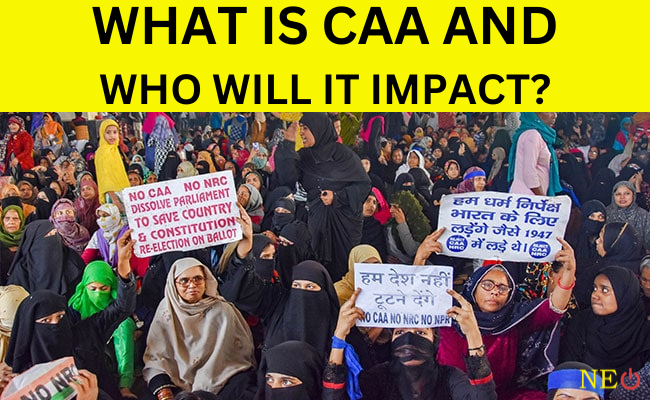On Monday, as expected, the Centre issued the guidelines for implementing the contentious Citizenship (Amendment) Act (CAA) 2019, ahead of the 2024 General Elections. This has prepared the way for the citizenship of undocumented non-Muslim migrants from Pakistan, Bangladesh, and Afghanistan.
The Modi government will now begin granting Indian nationality to persecuted non-Muslim migrants from the aforementioned nations who arrived in India before December 31, 2014, following the issuance of the CAA regulations. These include Christians, Parsis, Buddhists, Jains, Sikhs, and Hindus.
Table of contents [Show]
What is CAA?
The Citizenship Amendment Act (CAA) seeks to protect people who have sought asylum in India because of religious persecution. It protects them from illegal migration proceedings. To be considered for citizenship, applicants must have entered India on or before December 31, 2014. Currently, Indian citizenship is conferred to persons who were born in India or have resided there for at least 11 years. The proposed change also includes a clause that allows the termination of Overseas Citizen of India (OCI) registration if the OCI cardholder violates any provision of the Citizenship Act or any other applicable legislation.
Who does CAA leave out?
Since 2019, main opposition parties have argued that the law is discriminatory since it targets Muslims, who account for around 15% of the country's population. The government argues that because Pakistan, Afghanistan, and Bangladesh are Islamic countries with a Muslim majority, Muslims cannot be considered persecuted minorities. However, they ensure that submissions from other communities will be considered on an individual basis.
How can migrants apply for citizenship?
Because the entire process will be completed online, the Ministry of Home Affairs has created a portal for the applicants' convenience. The applicants must reveal the year they entered India without proper papers.
Why has the Opposition been up in arms against it?
The contentious Citizenship Amendment Act (CAA), passed in December 2019, has sparked outrage and protests around the country. Many political groups have denounced the bill as "discriminatory".
The Congress party has expressed alarm over the timing of the rule notification, claiming that it is meant to polarise the approaching Lok Sabha elections in West Bengal and Assam.
Congress general secretary Jairam Ramesh has accused the government of trying to divert attention after the Supreme Court's recent comments on the electoral bonds issue. He stated,
“After seeking nine extensions for the notification of the rules, the timing right before the elections is evidently designed to polarise the elections, especially in West Bengal and Assam.”
Kerala Chief Minister Vijayan has vowed that the CAA will not be implemented in the state, calling it a law that fosters religious conflict.
The anti-CAA protests followed by police action claimed more than 100 lives.
As previously stated, the CAA was passed nearly four years ago. According to the criteria outlined in the Manual of Parliamentary Procedures, the rules for any legislation must be drafted within six months of presidential assent or seek an extension from the Committees on Subordinate Legislation in both chambers of Parliament.
Since 2020, the home ministry has been taking extension in regular interval from the parliamentary committees for framing the rules.
However, it was only in December 2023 that Union Home Minister Amit Shah emphasized that no one can stop the execution of the CAA because it is the law of the nation, and that the BJP is committed to implementing the CAA.
The timing of the notification is particularly important, as the Lok Sabha elections are expected to be announced in a few days, and the Model Code of Conduct may be enforced shortly after.
How many people may seek citizenship under the new rules?
While no estimate has been provided, according to the Ministry of Home Affairs' annual report for 2021-22, from April 1, 2021 to December 31, 2021, 1,414 foreigners from Pakistan, Bangladesh, and Afghanistan were granted Indian citizenship through registration or naturalization under the Citizenship Act of 1955.
The Citizenship Act of 1955 offers Indian citizenship to non-Muslim minorities from Pakistan, Bangladesh, and Afghanistan by registration or naturalization in nine states: Gujarat, Rajasthan, Chhattisgarh, Haryana, Punjab, Madhya Pradesh, Uttar Pradesh, Delhi, and Maharashtra.









